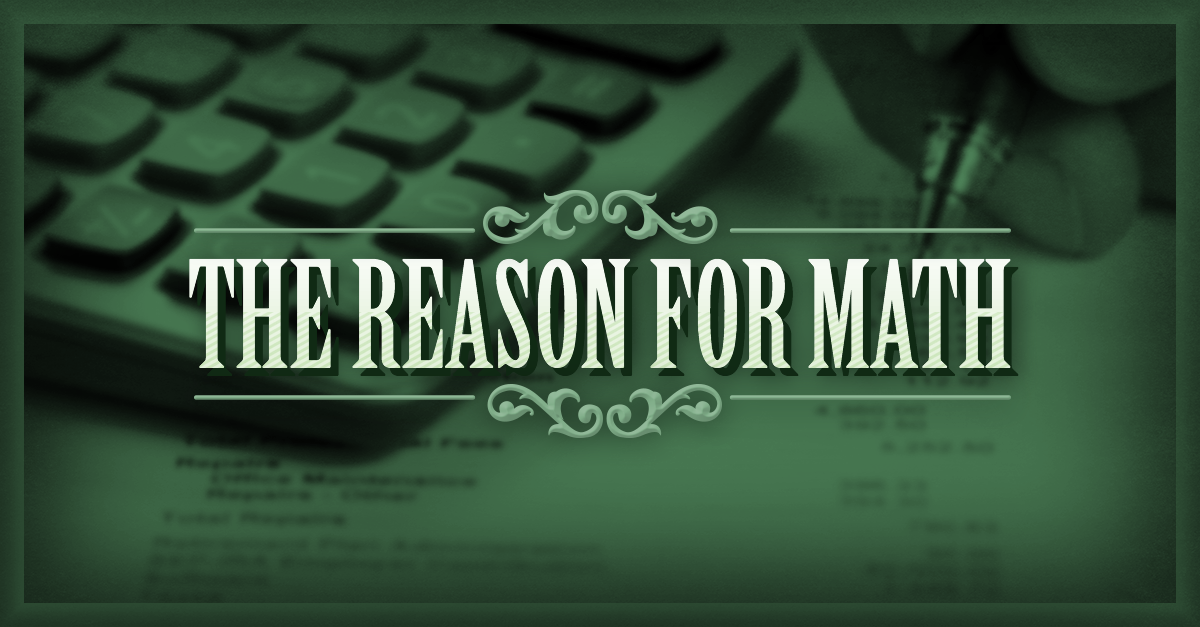The Reason for Math

One of the greatest inhibitors for students in learning math is that it seems impractical and unnecessary to them and thus they lack motivation to apply themselves. However, there are good reasons for learning math. In this post we’ll explain the reason for math.
The Reason for Math
We learn math so that we can solve problems and solve them more quickly and easily than we could without skill in mathematics. There will be times in our lives that we will be required to solve a mathematical problem. From passing that college math class to managing personal finances to the math problems that pop up on the job, solving math problems is an important part of life.
The amount of math problems you will be required to solve for your job varies significantly by occupation. It is also worth noting that while most jobs will not require much in the way of advanced mathematics, the math-heavy jobs pay more, and interestingly enough this is even more true for blue-collar jobs than for white-collar jobs.
While most jobs require far less math than teachers think, they can also be done more quickly and efficiently with more advanced mathematical skills. For example, although very little math is required for everyday personal finance, the more math you know the better your financial decisions may be (especially when it comes to things like loans, investments, and shopping for high-priced items). The majority of the practical benefits of mathematical education are optional but still significant. Most people only use the math they understand and feel comfortable with, but with more understanding comes increased opportunity.
We learn basic math so that we can use it to learn more advanced math. Much of the math we learn, especially in high-school Algebra, may only be useful some of the time, but very important for learning more advanced math like statistics or calculus. Along with learning more advanced math, we also learn basic math so that we can use it to learn more advanced subjects like physics, chemistry, etc. Fractions, unit conversions, and basic linear algebra are all critically important for physics and chemistry, even at the high school level. Possessing the necessary elements for advanced learning gives more opportunity for more career options in the future.
We learn math so that we can understand, appreciate, and critically evaluate the math done by others. This point often overlooked. In most areas of life, only a few people are actually doing the math in terms of solving the math problems and equations for the first time and the vast majority of day-to-day problem solving is done by computers and not people. Being able to do math is nowhere near as important for most of us as understanding the math that other people or computers are doing for us. Your bank will be calculating interest, your car will be calculating gas mileage, scientists and statisticians will be doing the research you read, and accountants will be doing the financial math that is really important.
Maybe you will not be an engineer, a programmer, or an accountant, but it’s likely that you will be working with one and will need to understand and evaluate the job that they are doing. Even personal health and basic citizenship can be significantly enhanced by understanding statistics and probability well enough to critically evaluate competing claims in articles, news reports, or shared on social media.
We need to teach math in a way that allows children to understand and appreciate in their own mathematical work and the mathematical work of others. Just like we teach our children to understand and appreciate a Beethoven symphony or a Picasso painting, we can also teach our children to recognize and appreciate a well crafted equation. All of the reasons for studying art, music, and history in high school apply equally to studying algebra and geometry. We need to start teaching our children algebra and geometry in a way that highlights their necessity and cultural significance.
Recommended Resources:
Paul Lockhart’s essay, A Mathematician’s Lament (PDF). He makes a case that math should be taught like art and shows why the way math is normally taught can be unproductive.
Read this article in The Atlantic about how math-heavy jobs pay more, especially for blue-collar jobs.